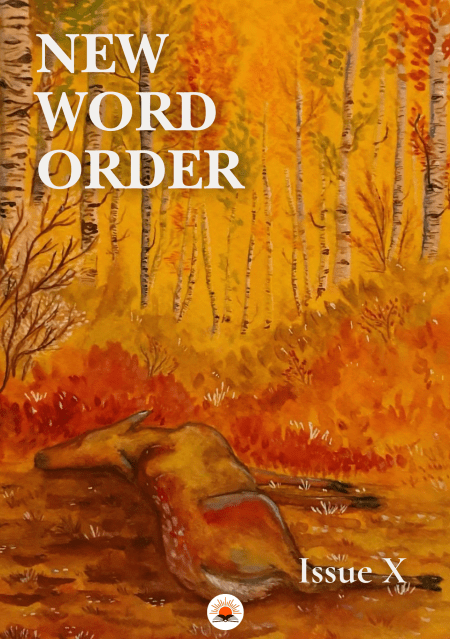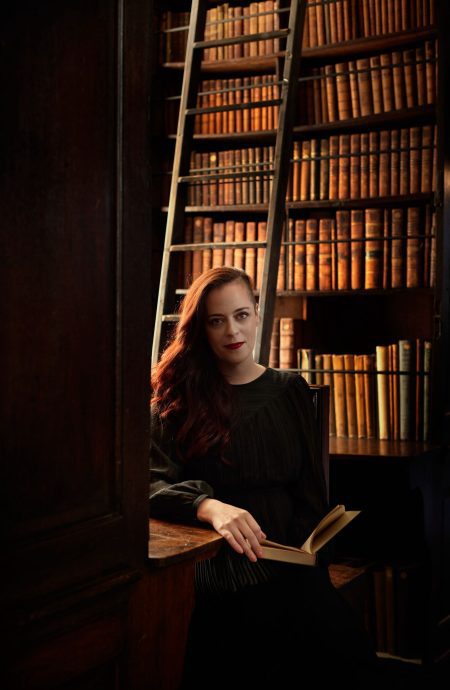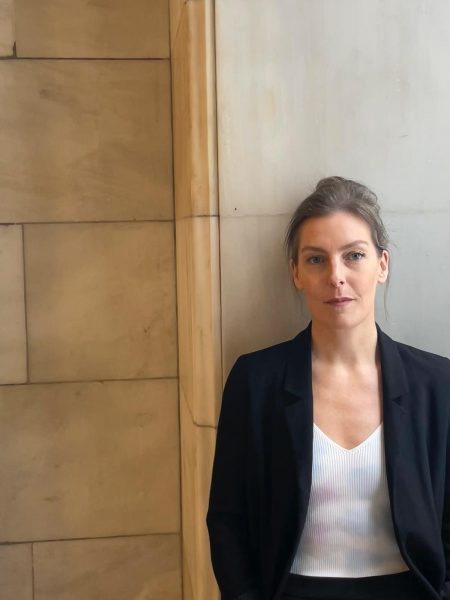(as done by Colm O’Shea)
On her career and recent success with the UCD and NCAD Belonging Project. Cover: Dr. Emma Farrell herself, speaking at the launch of the Belonging Project. The event was held at the Museum of Literature Ireland (Image taken by Jason Clarke and provided to us by Dr. Emma Farrell, all rights reserved).
Reader,
It’s no surprise that as an education centre and a shiny blue, yellow and black beacon of Irish life, University College Dublin has been the stomping grounds for many types of people across the country and beyond.
It is a surprise however, that it took until February of 2023 to establish an arts project celebrating that fact.
This collective, affectionately called “The Belonging Project”, tasked the then current students and staff of the college with talking about a moment where they felt like they belonged at the university.
In August of that year, with fourty written pieces, as well as fourty students from the National College of Art and Design,the Belonging Project was launched in the Museum of Literature Ireland, a writing and art exhibition all about the theme of belonging.
With the recent move of the exhibition to the UCD Village upper floors, questions are now involved of who organised the exhibit, why, the work that was done between both colleges and what it has in connection with students who are struggling to find a place in the university.
To understand this, I sat down with Dr. Emma Farrell, the creator and chief curator of the Belonging Project to answer all of these questions. And to further gloat about me being featured in the exhibition as well.
Here’s how our conversation went:
C.OS: So just to start things off Dr. Emma Farrell, please tell me a little bit about who you are and what you usually do at UCD.
Emma Farrell: My name is Emma Farrell. I’m a researcher in the School of Education. I think a lot of people don’t know what a researcher does but I think it’s perhaps one of the best jobs at the university.
I get to work full time with colleagues answering big questions in creative and interesting ways. Some of the questions I’m focused on answering at the moment relate to how we communicate people’s lived experiences as evidence to inform policy and practice.
So for example I work on a European Commission funded study, the Sophia study, which is focused on obesity. And it’s a huge international study, which UCD is one of the lead partners in. And it involves scientists and clinicians and people from all over the world trying to figure out how do we best understand and respond to obesity. Which is an important and growing societal challenge.
And my job within that study was to make sure that, as we develop policy and guidelines for practice, that people living with obesity, their voices and experiences, are at the heart of the development of this policy and practice.
So that’s what I do for a great deal of my time. I also work on other really interesting questions.
Like, one of the other projects I work [on] is called Thinkful. Where I work with my colleagues and friends in Philosophy, to understand how philosophy can help us understand that phenomenon of mental health.
So my background is in mental health. I am a psychologist, I’m a founding member of Jigsaw, Ireland’s national centre for youth mental health, and I’m really interested in understanding how we can think about [a] phenomenon like mental health in a very rich and diverse way.
And the other question, which of course as you know, that I’m really interested in at the moment is belonging. Particularly, how we lost that sense of connection and belonging during the pandemic and the impact that that has had on students and staff at the University. But perhaps more importantly, how we can rekindle that sense of belonging on campus. And so that’s where the Belgoning Project came from.

C.OS: So where did the idea of the Belonging Project come from?
The idea for the Belonging Project came from a sense, if you can remember back to Spring 2022, that students and staff were really struggling to come back to campus.
There was a lot in the media about students’ mental health and that they were struggling to attend lectures and to socialise, but equally there was a narrative around staff reluctance to come back to campus.
And I felt that, rather than focus on what was missing, you know the negative, let’s consider what the opposite is. And that for me, the opposite to disconnection is belonging.
“We just really wanted to connect with that essence of belonging, where it is found, what does it feel like. And I think that’s what we managed to do.”
So I really wanted to understand belonging and particularly belonging on campus. Where it’s found, where it flourishes, where it flounders.
And so, I connected with a group of colleagues and friends from across the university. So those are Dr. Shane Bergin, Dr. Aíne Mahon who are also in the School of Education and Dr. Lisa Forin who is in the School of Philosophy. And we came together to think about how we could creatively understand belonging.
And we got some very small seed funding and we decided to invite students and staff from across UCD to tell us about a time that they felt they belonged on campus. And that’s where you were involved, Colm, you were one of the many students who wrote.
We got poems, autobiographical reflections, stories, haikus, a whole variety of different accounts of belonging on campus.
We shortlisted fourty of these then and passed these to our colleagues and friends in NCAD. And students there were tasked with creatively representing the essence of belonging in the written pieces.
So your piece is a great example and I really encourage you to talk about it if you feel comfortable doing that, about what you wrote and the artwork that came out as a result of it, I think it’s a fantastic example.
But we just really wanted to connect with that essence of belonging, where it is found, what does it feel like. And I think that’s what we managed to do.
I was so struck [by] your story and how Belfield FM was the environment in which you found your tribe, or for other people it was the American Football Club or just the quiet corner in the library. Unfortunately we’ve heard a lot about how people often felt like they didn’t belong in UCD and that their belonging came from the long bus journeys to and from campus.
We learned an awful lot about the people, the places, the conditions in which belonging is supported and nourished. And that’s really what the project has been.
It culminated at the seminar and exhibition in MoLI, the Museum of Literature Ireland, on the 29th of August, so it gave us a chance to think about belonging in a scholarly way. It was a day of stories, and students and staff and scholars – all talking about belonging from different and diverse perspectives.
And then we had the wonderful evening exhibition where we got to share and connect around the stories of belonging and the artwork that arose from them.
C.OS: And I guess just on the subject of NCAD and MOLI, how did you organise working with them?
Well, this project Colm started off very small.
Initially, we had just planned to invite the written submissions from UCD students and staff. And then I have a good friend called Rob Farley who is a tutor at NCAD. And he was the one who said “do you know this would [be] really excellent for Bureau + students.” He’s a tutor there but he also runs his own design studio.
So he was the one who made the link and when we got in touch with our colleagues in NCAD, Claire Campion and John Slade, they were just thrilled to have good content to work with for their students.

Bureau + is a year that really takes students kind of out of the classroom and more into real world settings. So they are given projects as if they were real world jobs. So our project turned out to be a perfect example of the type of work that they like to take on in that year. So it was our good relationships and a good fortune to make that connection.
They were absolutely a joy to work with. Some of our team from UCD went out to NCAD at different points throughout the year to meet the students to see how the work was progressing and then we just collectively worked together to make the whole exhibition work.
It was very much run on a shoestring, so we were begging, borrowing and stealing from different people across the college, and really the whole project was run on good relationships and good will.
And part of that is the MoLI piece. MoLI is one of the greatest assets that UCD has. I was very fortunate to launch my book in MoLI last year. And I got in touch with a colleague called Flora in MOLI and she was the one who really made it happen.
She was the one who supported us to use the whole building, so the two houses for the whole day, set up the exhibition, ran the seminar and it was just such a joy to work with them. And particularly considering it was all free of charge for us at UCD.
C.OS: I guess just the next question I have, for those unsure at UCD, like as a new student or an old student, what message would you have for them and are there any stories from the project that you’d probably recommend for them?
That’s a really great question Colm.
I think the thing that struck me and I think others from this project was, often when we feel disconnected or lonely, we think we’re the only one.
I think we’ve all had that experience of looking around us on campus and wondering, how does everybody else know each other? Everyone seems to have friends and places to go and people to talk to. So when you feel disconnected or alone it can often feel like you’re the only one.
But I think what came through all of the stories for me was that everybody felt like they were the only one. That a sense of belonging often starts from a place of loneliness.
And what’s really interesting for me was to find how people found a place of belonging. There’s no one formula to find your tribe or to find a sense of community or to feel like you are a part of something bigger.
“Often we feel like we’re alone, we’re the only one who doesn’t fit in and I think the stories just demonstrate how that isn’t the case.”
I think of one student who wrote about coming back to university in her sixties. And that all the students in her class were undergraduates within their twenties. And she talked about a project that they did together as a group that allowed her to connect with them, work with them and make some really great friends.
I think of another colleague actually,who also spoke at the launch, who described how she almost left UCD as an undergraduate but that it was somebody who said “give it time” and made the connection with her and just gave her a little bit of encouragement that meant that she stayed on to complete her degree and is in UCD all these years later as a professor.
So I think that what I found from the stories was that, often we feel like we’re alone, we’re the only one who doesn’t fit in and I think the stories just demonstrate how that isn’t the case. That so many people feel that they don’t belong at times. But also that belonging can be found in the most diverse and unusual and remarkable places and ways.
C.OS: And just as my last question, any details you’d like to share, like, any other projects you’ve been working on if people would like to learn more about you?
Well I think we’re currently doing some updates to the website Belonging.ie, which will hopefully be able to share soon if people are more interested in learning about the project.
There’s also a website I run with Dr. Anya Mahon called Thinkful.ie which shares a lot of original work from scholars and students who are thinking about mental health and wellbeing in a kind of more philosophical way. Yeah I think those are probably two good places to start.
C.OS: Thank you for your time Dr. Farrell. As mentioned, the Belonging Project is currently on display at the UCD Village centre but if you want to catch the story I wrote for the exhibit “DJ Basket Case”, check out my blog (cplisken.medium.com) for more information. And if you feel left out at UCD, remember that all students feel a similar way to you.
Whether you’re a new, veteran, or graduate student, remember that our college is open to all who wish to learn. And though it will take some time, you too will hopefully find your place within the campus. You just have to be willing to look for it.
Sincerely,
Colm.

Colm O’Shea (he/him) is a writer from Dublin, Ireland. A Fourth Year English with Creative Writing student, he has had short stories published on two different occasions, alongside a Creative Writing Award for Adults with Learning Difficulties at the Listowel Writer’s Week 2023. You can find more about him via his blog (cplisken.medium.com) or his Instagram (@cplisken).



